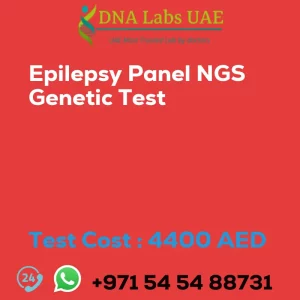USP8 Gene SPG59 USP8 related Genetic Test
Test Name: USP8 Gene SPG59 USP8 related Genetic Test
Components: Blood or Extracted DNA or One drop Blood on FTA Card
Price: 4400.0 AED
Sample Condition: Blood or Extracted DNA or One drop Blood on FTA Card
Report Delivery: 3 to 4 Weeks
Method: NGS Technology
Test Type: Neurological Disorders
Doctor: Neurologist
Test Department: Genetics
Pre Test Information: Clinical History of Patient who is going for USP8 Gene SPG59, USP8 related NGS Genetic DNA Test. A Genetic Counselling session to draw a pedigree chart of family members affected with USP8 Gene SPG59, USP8 related.
Test Details:
The USP8 gene is associated with a rare genetic disorder called hereditary spastic paraplegia type 59 (SPG59). This disorder is characterized by progressive stiffness and weakness in the legs (spastic paraplegia) due to the degeneration of certain nerve fibers in the spinal cord.
A USP8-related next-generation sequencing (NGS) genetic test is a diagnostic tool used to identify mutations or variants in the USP8 gene. This test can help confirm a diagnosis of SPG59 and provide important information for genetic counseling and treatment planning.
NGS technology allows for the simultaneous sequencing of multiple genes, including the USP8 gene, in a more efficient and cost-effective manner compared to traditional sequencing methods. This enables a comprehensive analysis of the genetic code, increasing the likelihood of identifying disease-causing mutations.
The USP8-related NGS genetic test typically involves obtaining a blood or saliva sample from the individual undergoing testing. The DNA in the sample is then sequenced using NGS technology, and the resulting data is analyzed for mutations or variants in the USP8 gene.
The identification of a disease-causing mutation in the USP8 gene can confirm a diagnosis of SPG59 and help guide appropriate management and treatment strategies. Additionally, genetic testing can provide valuable information for family members who may be at risk of inheriting the condition.
It is important to note that USP8-related NGS genetic testing should be conducted by a qualified healthcare professional or genetic counselor who can interpret the results and provide appropriate counseling and support.
| Test Name | USP8 Gene SPG59 USP8 related Genetic Test |
|---|---|
| Components | |
| Price | 4400.0 AED |
| Sample Condition | Blood or Extracted DNA or One drop Blood on FTA Card o |
| Report Delivery | 3 to 4 Weeks |
| Method | NGS Technology |
| Test type | Neurological Disorders |
| Doctor | Neurologist |
| Test Department: | Genetics |
| Pre Test Information | Clinical History of Patient who is going for USP8 Gene SPG59, USP8 related NGS Genetic DNA Test A Genetic Counselling session to draw a pedigree chart of family members affected with USP8 Gene SPG59, USP8 related |
| Test Details |
The USP8 gene is associated with a rare genetic disorder called hereditary spastic paraplegia type 59 (SPG59). This disorder is characterized by progressive stiffness and weakness in the legs (spastic paraplegia) due to the degeneration of certain nerve fibers in the spinal cord. A USP8-related next-generation sequencing (NGS) genetic test is a diagnostic tool used to identify mutations or variants in the USP8 gene. This test can help confirm a diagnosis of SPG59 and provide important information for genetic counseling and treatment planning. NGS technology allows for the simultaneous sequencing of multiple genes, including the USP8 gene, in a more efficient and cost-effective manner compared to traditional sequencing methods. This enables a comprehensive analysis of the genetic code, increasing the likelihood of identifying disease-causing mutations. The USP8-related NGS genetic test typically involves obtaining a blood or saliva sample from the individual undergoing testing. The DNA in the sample is then sequenced using NGS technology, and the resulting data is analyzed for mutations or variants in the USP8 gene. The identification of a disease-causing mutation in the USP8 gene can confirm a diagnosis of SPG59 and help guide appropriate management and treatment strategies. Additionally, genetic testing can provide valuable information for family members who may be at risk of inheriting the condition. It is important to note that USP8-related NGS genetic testing should be conducted by a qualified healthcare professional or genetic counselor who can interpret the results and provide appropriate counseling and support. |








